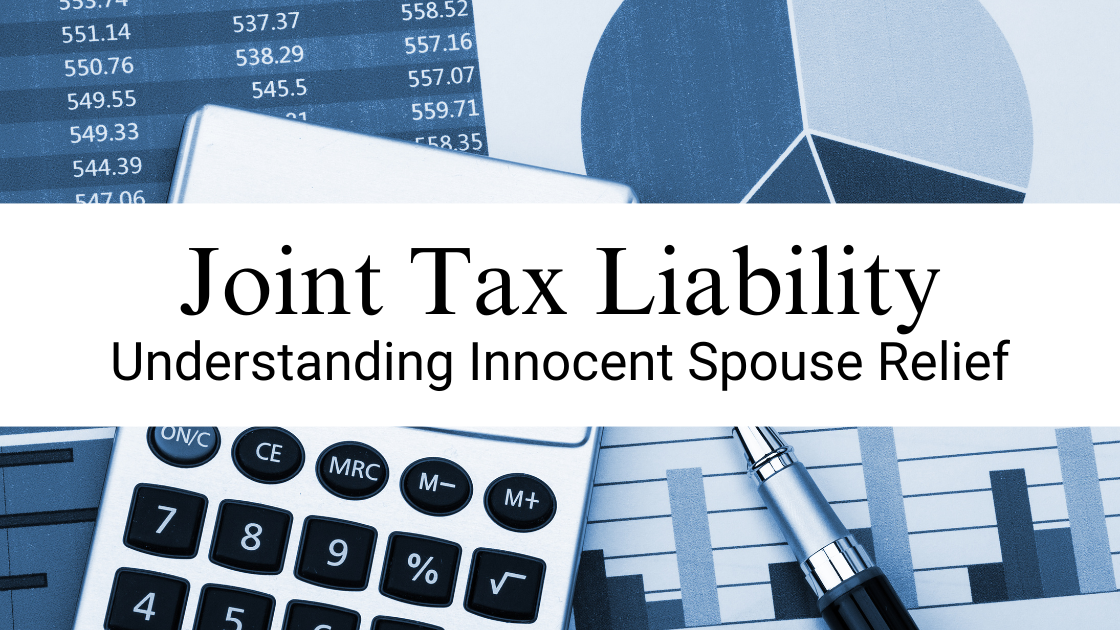As a family law attorney, certified financial analyst, and someone who is married (for the second time), I can attest that filing a joint tax return with your spouse can make an often convoluted process easier and more efficient. However, it also comes with shared responsibility for actually paying any taxes owed, including interest and penalties. Even more concerning, this joint liability can become an issue if your spouse understates taxes due to errors or omissions you were unaware of.
For example, if your spouse fails to handle matters correctly, business ownership, as well as involvement in charitable organizations, nonprofits, or tax-exempt bonds, can lead to tax errors, resulting in substantial liabilities. The good news is that innocent spouse relief from the IRS can relieve you from paying additional taxes in certain circumstances. Here’s what you should know.
Am I eligible for innocent spouse relief?
To qualify for innocent spouse relief (IRC 6015(b)), the Requesting Spouse (RS) must satisfy all five of the following conditions: A valid joint tax return was filed for the year you are asking for relief, there is a tax understatement caused by mistakes made by the Non-Requesting Spouse (NRS), the Requesting Spouse (RS) did not know and had no reason to know about the understatement when signing the return, considering all the facts, it would be unfair to hold the RS responsible for the understatement caused by the NRS, and the spouse requesting relief must do so within two years from the first collection activity related to the RS after July 22, 1998.
Common mistakes leading to understated taxes include unreported income, incorrect deductions or credits, and incorrect asset valuation.
As stated earlier, when you file jointly with your spouse, you both are responsible for the taxes due and any other associated interest or penalties, regardless of the filing process. This reality applies irrespective of whether you divorce at a later date, your divorce decree states that your spouse must pay the taxes, or your spouse earned all the income.
If your spouse has passed away, you may still request innocent spouse relief if you meet the eligibility requirements. However, you may not seek relief for taxes owed on your personal income, household employment taxes, Individual Shared Responsibilitypayments, business taxes, or trust fund recovery penalties related to employment taxes.
It is also worth mentioning that although different life stages and roles — being a student, employee, parent, military member, or senior citizen — can affect tax responsibilities, the eligibility criteria for innocent spouse relief still apply. The same holds for international taxpayers, employees of governmental entities, and members of Indian tribal governments. They, too, must follow the same rules and procedures when applying for innocent spouse relief.
The IRS considers many factors specific to your situation before making a decision. Regardless, you will be ineligible for relief during years when you accept an offer in compromise with the IRS, sign a closing agreement with the IRS covering the taxes in question, a court makes a final decision denying you relief, or you participate in a related court proceeding and don’t request relief.
How can I file for innocent spouse relief?
Time is of the essence when requesting innocent spouse relief. You must file your request within two years of receiving an IRS notice informing you of an upcoming audit or that you owe taxes resulting from an error on your return. It’s important to act once you become aware of the understated taxes.
If you discover errors on your joint tax return, you can file an amended return. Doing so doesn’t mean you forfeit your eligibility to apply for innocent spouse relief as long as you meet the criteria.
When requesting innocent spouse relief, you must file Form 8857. The IRS will consider your entire case and apply the relief it deems you eligible for, if any. The Request for Innocent Spouse Relief form covers two other types of relief besides innocent spouse relief: separation of liability relief and equitable relief. They are discussed in more detail below.
What other types of relief may be available to me?
Once you apply for innocent spouse relief, the IRS will automatically also consider you for two other types of relief. One such type is separation of liability relief, which provides that if you are divorced, separated, or not living with your spouse, you might only be responsible for your portion of the understated taxes.
Equitable relief is another option. If you don’t qualify for the other two types of relief, you may be excused from paying taxes your spouse understated or underpaid if it would be unfair to hold you accountable in light of all the facts and circumstances in your case.
It is important to note that you cannot claim innocent spouse relief if you knew of the errors on your return or if a reasonable person in similar circumstances would have known of them. If you are the victim of domestic abuse, you may still be eligible for relief despite knowing about the errors if you signed the return due to fear or pressure from your spouse.
When filing for relief, check that all your personal information is accurate and up-to-date. That includes your legal name, address, and Social Security number. Major life events such as marriage, divorce, separation, or the death of a spouse can impact your tax situation and eligibility for innocent spouse relief, so it is necessary to include this information where requested.
What happens if I receive a notice from the IRS?
Should you receive an IRS notice that you owe taxes on a joint return, follow the instructions in your letter and request innocent spouse relief as soon as possible. The IRS will review your application and contact your spouse (or ex-spouse) to ask if they want to participate in the process.
The timetable is long; the IRS may take up to six months or more to review your request. In the meantime, you should continue to file and pay your taxes as usual. Once the review is complete, the IRS will send a letter with its decision. Both spouses may appeal within 30 days from the date of the determination letter.
Although dealing with the IRS can be frustrating, you don’t need to do it alone. Given the complexities in applying for innocent spouse relief, seeking professional guidance from an attorney and financial professional can provide valuable support.

